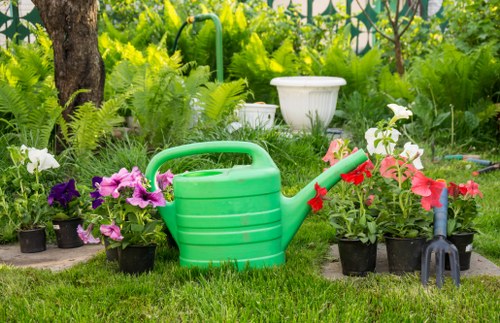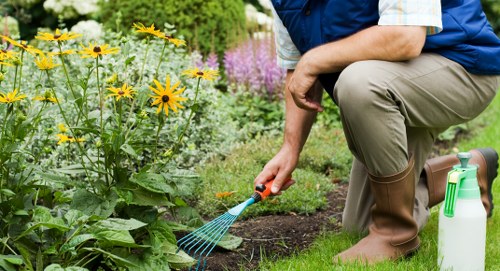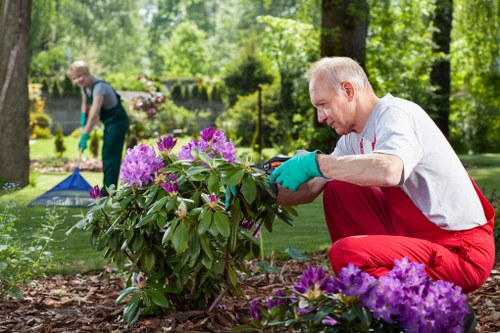Commercial Driveway Restoration in Newbury Park
A well-maintained driveway is essential for any commercial property, making a strong first impression on clients and visitors alike. In Newbury Park, businesses understand the importance of maintaining their exteriors to reflect professionalism and care.
Over time, commercial driveways can suffer from wear and tear due to heavy traffic, weather conditions, and aging materials. Restoring your driveway not only enhances the property's appearance but also ensures safety and functionality.
In this article, we'll explore the key aspects of commercial driveway restoration, the benefits it offers, and why Newbury Park businesses should invest in professional restoration services.

Importance of Driveway Maintenance for Businesses
A driveway serves as the main access point to your business premises. A damaged or poorly maintained driveway can lead to several issues, including:
- Safety Hazards: Cracks and potholes can cause accidents for both vehicles and pedestrians.
- Increased Liability: Businesses may face legal consequences if someone gets injured due to driveway neglect.
- Poor First Impressions: A deteriorating driveway can negatively impact your business's image.
Regular maintenance helps in preventing these issues, ensuring that your driveway remains functional and visually appealing.

Signs Your Commercial Driveway Needs Restoration
Recognizing the signs that your driveway needs restoration is crucial in addressing problems early on. Common indicators include:
- Cracks and Fractures: Visible cracks can expand over time, leading to more significant damage.
- Surface Erosion: Erosion can weaken the driveway structure, making it susceptible to further deterioration.
- Uneven Surfaces: Uneven areas can cause vehicle damage and pose trip hazards.
If you notice any of these signs, it's time to consult a professional driveway restoration service in Newbury Park.

Process of Driveway Restoration
The restoration process involves several steps to ensure a durable and attractive driveway:
- Inspection: Assessing the current condition to determine the necessary repairs.
- Cleaning: Removing dirt, oil stains, and debris to prepare the surface for restoration.
- Repair: Fixing cracks, potholes, and other damages using appropriate materials.
- Sealing: Applying a sealant to protect the driveway from future damage.
Each step is vital in achieving a long-lasting and high-quality restoration.

Benefits of Professional Driveway Restoration Services
Hiring professionals for driveway restoration offers numerous advantages:
- Expertise: Professionals have the knowledge and experience to handle various driveway issues effectively.
- Quality Materials: Access to high-quality materials ensures a durable and aesthetically pleasing finish.
- Time Efficiency: Professionals can complete restoration projects promptly, minimizing disruption to your business operations.
Investing in professional services guarantees that your driveway restoration meets industry standards and enhances your property’s value.

Choosing the Right Driveway Restoration Company in Newbury Park
Selecting a reputable restoration company is crucial for successful driveway restoration. Consider the following factors:
- Experience: Look for companies with a proven track record in driveway restoration.
- Reviews and Testimonials: Positive feedback from previous clients indicates reliability and quality work.
- Licensed and Insured: Ensure the company is properly licensed and insured to protect against potential liabilities.
Taking the time to research and choose the right company can lead to better results and a smoother restoration process.
Cost Factors in Driveway Restoration
The cost of driveway restoration can vary based on several factors:
- Size of the Driveway: Larger driveways require more materials and labor, increasing the overall cost.
- Extent of Damage: Severe damage may require more intensive repairs, affecting the price.
- Materials Used: The type and quality of materials chosen will influence the cost.
Obtaining multiple quotes and understanding the breakdown of costs can help you make an informed decision.

Materials Used in Driveway Restoration
The choice of materials plays a significant role in the durability and appearance of your restored driveway. Common materials include:
- Asphalt: Known for its durability and cost-effectiveness, asphalt is a popular choice for commercial driveways.
- Concrete: Offers a sleek and professional look, with options for decorative finishes.
- Interlocking Pavers: Provides a customizable and aesthetically pleasing surface.
Each material has its benefits, and professionals can help you choose the best option based on your specific needs and budget.

Maintenance Tips After Restoration
Proper maintenance can extend the lifespan of your restored driveway:
- Regular Cleaning: Remove debris and spills promptly to prevent staining and damage.
- Seal Coating: Apply a sealant every few years to protect the surface from the elements.
- Prompt Repairs: Address any new cracks or damages immediately to avoid further deterioration.
Implementing these maintenance practices ensures your driveway remains in excellent condition for years to come.

Areas Near Newbury Park for Driveway Restoration
While Newbury Park is a central hub for commercial driveway restoration, several nearby areas also benefit from these services:
- Thousand Oaks: Just south of Newbury Park, offering a range of restoration services.
- Ventura: West of Newbury Park, coastal businesses here prioritize driveway upkeep.
- Westlake Village: North of Newbury Park, known for its upscale commercial properties.
- Simi Valley: Southeast of Newbury Park, with a growing number of commercial establishments.
- Agua Dulce: East of Newbury Park, catering to both residential and commercial clients.
- Oak Park: West of Newbury Park, offering community-focused restoration solutions.
- Camarillo: Southwest of Newbury Park, a key area for commercial driveway services.
- Newbury Park Hills: A nearby neighborhood with specific restoration needs.
- Santa Rosa Valley: East of Newbury Park, combining commercial and residential restoration projects.
- College Park: Adjacent to Newbury Park, serving local businesses with restoration expertise.
- Center Street: A central area in Newbury Park with concentrated commercial activity.
- Granada Hills: Northwest of Newbury Park, expanding its commercial infrastructure.
- Somis: Northwestern area, blending agricultural and commercial restoration needs.
- Wildwood: Southwest of Newbury Park, with businesses seeking quality driveway solutions.
- Woodbridge: Northeast of Newbury Park, supporting both new and established commercial properties.
Conclusion
Investing in commercial driveway restoration in Newbury Park is a strategic decision that enhances your business's appearance, safety, and functionality. By recognizing the signs of damage, choosing the right materials, and maintaining your driveway properly, you can ensure a lasting and positive impact on your property and clientele.
Whether you're in the heart of Newbury Park or in one of the nearby areas, professional driveway restoration services are available to meet your needs and help your business make the best possible impression.
Frequently Asked Questions
1. How often should a commercial driveway be restored?
Typically, a commercial driveway should be inspected annually and restored every 10-15 years, depending on the level of traffic and environmental conditions.
2. What factors affect the cost of driveway restoration?
The size of the driveway, extent of damage, choice of materials, and labor costs are primary factors influencing restoration expenses.
3. Can I restore my driveway without professional help?
While minor repairs can be DIY, professional restoration ensures quality work, longevity, and adherence to safety standards.
4. How long does driveway restoration take?
The duration varies based on the project's scope but generally ranges from a few days to a couple of weeks for larger commercial driveways.
5. What materials are best for commercial driveway restoration?
Common materials include asphalt, concrete, and interlocking pavers, each offering different benefits in terms of durability and appearance.


